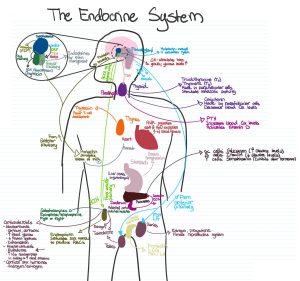
The endocrine system consists of glands which secrete or release hormones into your bloodstream. These hormones signal other parts of the body (organs like the heart and lungs, muscles, the digestive system) to respond to the receipt of the hormone by starting, accelerating, decelerating, stopping or altering aspects of their functionality.
For instance when confronted with a survival threat your adrenal glands release adrenaline. When adrenaline is released, it affects the body in six key ways:
• It causes air passages to widen (dilate) to provide muscles with the oxygen they need to either fight or flee danger.
• It causes blood vessels to narrow (contract) to redirect blood flow to major muscle groups, including the heart and lungs.
• It causes the heart rate to speed up and the heart to contract more forcefully so that more oxygen is delivered to muscles and tissues.
• It causes the liver to release blood sugar (glucose), which provides the body with energy.
• It causes the pupils of your eyes to dilate (known as stress-induced mydriasis) so that you see more clearly, even in the dark.
• It reduces the perception of pain (known as stress-induced analgesia) so that you can continue fighting or fleeing even if you are injured.
Adrenaline is not only released when there is actual danger but also during moments of emotional stress. This may include taking a test, watching a scary movie, speaking in public, going out on a date, or doing an extreme sport like skydiving.
Various toxins, external and ingested, can affect the operation of the endocrine system.

